To introduce these four new books by one particular publisher I wanted to explain – in case ya hadn’t noticed – that we carry all manner of publishers, large and small, faith-based and otherwise, like any full service bookstore. We’ve got some general market best sellers, most of the popular religious best-sellers, but, better, a strong backlist of all kinds of good stuff, from across the faith-based publishing universe and beyond. We’re a little quirky and wanted to brag about our different publishers so I found myself describing a dozen houses, and some of their books. Man, talk about a tangent, before we even got out of the gate.
Sooooo, I deleted that so we can get right to it.
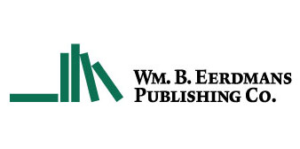 WM. B. EERDMANS
WM. B. EERDMANS
One of the great, storied publishers that we most enjoy is the Wm. B. Eerdmans Publishing Company whose offices have been in Grand Rapids, Michigan, since 1911. We are told that Eerdmans, in Dutch, means “Earth-man,” perhaps because their ancestors were farmers, or at least rural; the elder Bill was born in the 1800s and came to the US from Holland as an immigrant in 1902. Eerdmans may be the premier publisher for serious academic theological and Biblical studies work (although IVP Academic and Baker Academic have given them a great run for their money in recent years, doing more, and perhaps more valuable, academic theology books than anyone.) Hardly anyone who follows these things, though, would disagree that Eerdmans has been one of the stalwart publishing houses in the United States and their influence in the religious publishing world has been extraordinary. They are quirky the way a family-owned business can be, and that’s part of their charm, too. We could fill up pages of their enduring classics, recent award-winning books, and their delightful curiosities (like Holy Spokes: The Search for Urban Spirituality on Two Wheels, a book about urban biking, or God, Improv, and the Art of Living by Maryann McKibben Dana.)
Eerdmans and their sales reps serve us well and we want to shout out to them alongside the other publishers whose books we carry. Without these publishing houses vetting and marketing thoughtful works, the religious publishing industry – wild and wooly and often infuriating as it is — would be a really hot mess. We are grateful for the considered and valuable books classy publishers like Eerdmans bring to the marketplace. Theirs are almost always books worth knowing about and often well worth owning.
FOUR BRAND NEW BOOKS FROM EERDMANS
Here are four brand new Eerdmans releases that came in this week. They are among the most important religious books of the fall. You can order any of them at our secure website order page by following the link below. Just type in what you want and we’ll follow up promptly.
All of these are 20% OFF.
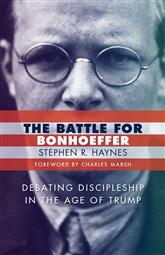 The Battle for Bonhoeffer: Debating Discipleship in an Age of Trump Stephen R. Haynes (Eerdmans) $19.99 I haven’t read this yet but you may guess right from the start what it is about, and many Hearts & Minds friends are going to be interested. Yep, it is – among other things – about Eric Metaxas and his own work on and recent use of Dietrich Bonhoeffer, the great German Lutheran who called us to “the cost of discipleship” and was executed for his resistance to the Nazi regime. You may know (I hope you do) Mr. Metaxas’ exceptionally readable, evangelically-minded, major biography entitled Bonhoeffer: Pastor, Martyr, Prophet, Spy: A Righteous Gentile vs. the Third Reich (Thomas Nelson; $19.99.) Like his previous Wilberforce bio (Amazing Grace) and his more recent book on Luther, Eric has brought the drama, historical background, arcane details and big picture vision of major historical characters to a popular level with his captivating prose and robust storytelling. (His smaller, but thrilling, 7 Great Men and 7 Great Women are coming out in a single volume later this fall!) Metaxas is a clear, colorful writer, a passionate thinker, and his Bonhoeffer book is massive; that’s a good thing, in this case, as there is so much to say, and he says it so well that many a reader wished it wasn’t over, even after 600 pages! There are a lot of books out there by and about Bonhoeffer and there is little doubt that Metaxas’s has sold more than any other.
The Battle for Bonhoeffer: Debating Discipleship in an Age of Trump Stephen R. Haynes (Eerdmans) $19.99 I haven’t read this yet but you may guess right from the start what it is about, and many Hearts & Minds friends are going to be interested. Yep, it is – among other things – about Eric Metaxas and his own work on and recent use of Dietrich Bonhoeffer, the great German Lutheran who called us to “the cost of discipleship” and was executed for his resistance to the Nazi regime. You may know (I hope you do) Mr. Metaxas’ exceptionally readable, evangelically-minded, major biography entitled Bonhoeffer: Pastor, Martyr, Prophet, Spy: A Righteous Gentile vs. the Third Reich (Thomas Nelson; $19.99.) Like his previous Wilberforce bio (Amazing Grace) and his more recent book on Luther, Eric has brought the drama, historical background, arcane details and big picture vision of major historical characters to a popular level with his captivating prose and robust storytelling. (His smaller, but thrilling, 7 Great Men and 7 Great Women are coming out in a single volume later this fall!) Metaxas is a clear, colorful writer, a passionate thinker, and his Bonhoeffer book is massive; that’s a good thing, in this case, as there is so much to say, and he says it so well that many a reader wished it wasn’t over, even after 600 pages! There are a lot of books out there by and about Bonhoeffer and there is little doubt that Metaxas’s has sold more than any other.
Two things you must know, though, things we routinely chat about with those who are interested in buying Bonhoeffer: Pastor, Martyr, Prophet, Spy… what I sometimes call Metaxas’ BBB (Big Bonhoeffer Book.) You see, not everybody likes it.
First, not just a few historians and Bonhoeffer scholars have insisted that Metaxas is a sloppy historian. He’s got a line or two mistaken about a historical episode in a book he wrote about the Founding Fathers. Maybe there is another Wilberforce book that is more tediously correct about everything in 18th century England. I suppose some disapproved of something in the Luther book but it was by far the most engaging one I’ve ever read about the great monk with a mallet. Some think he sacrifices facts for writerly color and eloquence in an attempt to be inspirational. Such claims don’t worry me much, to be honest, as he isn’t vying for best academic study of his topic: he’s a popularizer, I suspect he knows that, and, at that, he’s a good one. Of course if he were exceptionally inaccurate with the facts or out and out ridiculous (think of the likes of David Barton) we’d be concerned. But I’m not too interested in nit-picking a books like these that gets thousands of people interested in somebody like Wilberforce or Bonhoeffer or Luther.
But the second thing to know isn’t just whether Metaxas is fully accurate and impeccable as a popular biographer and history-writer. The second thing to know is that many think that Metaxas is fundamentally wrong about his understanding of Bonhoeffer’s faith and how to learn from him in our current socio-political climate. In other words, there is a concern about Metaxas’s reading of Bonhoeffer and his use of Bonhoeffer. The Battle for Bonhoeffer is not only about Metaxas, but telling about this part of it is a way into Hayne’s overall project in what seems to be a very impressive and important work.
The criticisms of Metaxas have been very strong, especially in his telling of the heart of the Bonhoeffer story. Those in the Bonhoeffer study guild – and it is a club, literally, believe me – denounced Metaxas as soon as his tome came out and then continued their attacks when it became as popular as it did. Mean-spirited critiques of the book – one which I found to be grossly unkind in The Christian Century – appeared almost overnight, many seeming to nearly drip with crass jealously. Who is this charismatic Christian with a preppy blazer and funny background who wrote for Veggie Tales and now dares to write about our post-religious, uber-liberal icon? He’s not in the club! How dare he make Bonhoeffer sound like a born-again American evangelical? Our guild has determined that Bonhoeffer’s no evangelical! (Interestingly, many evangelicals took their word for it and ignored or mistrusted Bonhoeffer for years; I was warned against him in college by people I trusted.)
Ends up, Metaxas – who is, did I say, one hell of a writer – with a degree from Yale, makes a pretty good case that Bonhoeffer did have something akin to a born-again experience while in exile from Hitler’s Germany. Strangely warmed, Bonhoeffer himself wrote specifically about it during his stay in New York where he studied, seemingly unhappily, at Union Theological Seminary but worshipped with black Christians in Harlem, about which he wrote piously. He took black gospel records back to Germany and they inspired him and his underground seminary movement until he was executed by the Fuhrer in 1945.
Those that read BookNotes (heck those that read my opening paragraph) know we’re pretty ecumenical and open-minded here, so I do not care as much as some if Metaxas is right or not. Bonhoeffer can be read and understood in the context of German liberal theology, mainline Lutheran Protestantism, or as more in keeping with historic orthodox Christianity as represented by evangelical thinkers. I think it is an open and good debate and I love getting liberals and conservatives, mainline folks and non-denominational ones, together to talk, even if it is a debate about who has the right to claim Bonhoeffer as their own. In The Battle for Bonhoeffer Stephen Haynes – who thinks Metaxas radically misunderstands Bonhoeffer and “appropriates” him for his own (conservative and even pro-Trump) political agenda — gives us the context for this debate and gives us the first book-length assessment of how Bonhoeffer has been received and understood since the post-war years and up until 2018. Analyzing Metaxas and his book and Metaxas’ subsequent project of marshaling Bonhoeffer for conservative Protestantism and its social agenda is only part of Battle for Bonhoeffer, but, oh, man, is it an interesting journey. And Metaxas’s project does, it seems to me, go haywire, as Eric gets involved with Fox News, links pro-life activism and the courts’ antagonism regarding religious liberties to our “Bonhoeffer moment” starts a largely right-wing radio show and now is an outspoken acolyte for President Trump.
Haynes (and anyone who writes about this, and all of us readers) must differentiate, I think, between two things: we must ask firstly if the Bonhoeffer book is mostly right, on the face of it, and separate that from whatever we may think of Metaxas’s conservative politics, his outspoken pro-life views, and his oddly incongruous support for President Trump. Like him or not, an evaluation of his 2010 Bonhoeffer is not the same as a referendum on Eric’s 2018 politics. It’s simple: we should review the book on its own terms, and not skewer our views of the book by ad hominem attacks about other stuff the author has said or done. Metaxas’ BBB (big Bonhoeffer Book) should mostly stand or fall on its own merits, not on whether you now like Metaxas or not.
And similarly, if folks with whom you disagree can marshal a strong case against the historical and theological substance of Metaxas’s Bonhoeffer) then we should listen to them, even if we don’t like their other political or theological views. We dare not disregard sound academic or theological critique of Brother Eric (even if you like him) because the critic is from a camp you don’t like.
I like Eric a lot, although I don’t know him well and have be disappointed my many of his public comments. I disagree profoundly with many of his current positions and am frustrated by some of his public demeanor. I think he knows this. Still, the question is important: is the big Bonhoeffer book of Metaxas, on the face of it, right and readable, more or less? Every 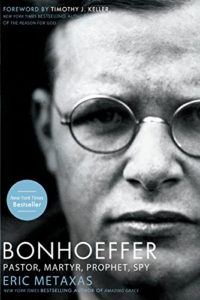 book has small details that are in error, but, given a relatively generous reading, is he mostly right and is he readable? If he’s significantly wrong, of course, then its popularity and vivid readability isn’t good, as it captivates readers and pulls them into a wrong-headed story. (On the other hand, while I’m at it, we surely know that a book can be pristinely perfect and if it is tedious or arcane or haughty or boring – as most books about Bonhoeffer are, if you ask me – then its accuracy or bold insight isn’t that valuable, since nobody reads it anyway.) Accuracy, wisdom, and enjoyable readability must combine to make a truly great book and I want to know the opinions of scholars who really care about Bonhoeffer; it is my hope that this new paperback by Haynes will be a helpful guide to some of this. I am less interested in those who are spiteful or jealous or who are in principle in opposition to evangelical faith, ruling Eric’s book out a priori. I am told that Haynes helps us sort through all this.
book has small details that are in error, but, given a relatively generous reading, is he mostly right and is he readable? If he’s significantly wrong, of course, then its popularity and vivid readability isn’t good, as it captivates readers and pulls them into a wrong-headed story. (On the other hand, while I’m at it, we surely know that a book can be pristinely perfect and if it is tedious or arcane or haughty or boring – as most books about Bonhoeffer are, if you ask me – then its accuracy or bold insight isn’t that valuable, since nobody reads it anyway.) Accuracy, wisdom, and enjoyable readability must combine to make a truly great book and I want to know the opinions of scholars who really care about Bonhoeffer; it is my hope that this new paperback by Haynes will be a helpful guide to some of this. I am less interested in those who are spiteful or jealous or who are in principle in opposition to evangelical faith, ruling Eric’s book out a priori. I am told that Haynes helps us sort through all this.
For what it is worth, two very well-done books about Bonhoeffer that give a somewhat different reading to the man and his work than Metaxas does that I highly recommend are Strange Glory: A Life of Dietrich Bonhoeffer by Charles Marsh (Vintage; $17.95) (who, by the way, wrote the foreword to Battle for Bonhoeffer) and Bonhoeffer’s Black Jesus: Harlem Renaissance Theology and an Ethic of Resistance by Reggie Williams (Baylor University Press; $39.95.) Williams, by the way, has a nice endorsing blurb on the back cover of Battle…A third fairly recent one that applies core teachings of Bonhoeffer to daily Christian living which I found very beneficial is Bonhoeffer on the Christian Life: From the Cross to the World by Stpehen J. Nichols (Crossway; $17.99.)
Haynes should be a helpful guide to all this; he has been writing about Bonhoeffer and his impact for years. Just a quick skimming and study of the footnotes and references makes me think he is excellent for this task. I’ve read his useful, little Bonhoeffer for Armchair Theologians (WJK; $18.00) and really look forward to his analysis of how brother Bonhoeffer is understood, taught, used, and promoted by different factions within the US (and elsewhere.)
As the back jacket puts it,
The figure of Bonhoeffer has become a clay puppet in modern American politics. Secular, radical, liberal, and evangelical interpreters variously shape and mold the martyr’s legacy to suit their own pet agendas.
That may be overstating it, as if differing views are crassly, intentionally, misinterpreting and misappropriating. I’d rather suggest that various theologies and even worldviews of various readers are influential in such a way as to facilitate differing interpretations, sincere misreadings, more-or-less internally coherent interpretations that are each based on fundamentally different presuppositions and hermeneutics. I don’t mean to say every reading or interpretation is equally valid, but it isn’t just that a few bad guys misuse a person like Bonhoeffer for their own “pet projects,” or not usually, anyway. I don’t think we should be cynical about this. Anyway, understanding how this appropriation thing works is itself a main theme of this book, and it’s so, so important – beyond this case study of Bonhoeffer and his fans.
Stanley Hauerwas writes about the book by saying:
Does it matter how Bonhoeffer is read in America? Anyone reading Hayne’s meticulously researched book will discover that it matters a great deal.
Of course, Eric Metaxas is not the only one to call us to a “Bonhoeffer moment.” Eric uses Bonhoeffer in support of a bold commitment to certain conservative stances in an increasingly secularized culture that is hostile, or so it seems, to traditional Christian views. But the cultural and religious left use Bonhoeffer, too, drawing on him for their own justice agenda. They think, of course, that Bonhoeffer titled left – willing to die as he bore witness against fascism, standing with the marginalized and oppressed.
Many (myself included) who have voiced strong criticisms of the way fundamentalist and some evangelical Christians have given so much unqualified support for President Trump – who just today announced cutting refugee resettlement numbers — have wondered if Bonhoeffer (and the blunt confession of the Lordship of Christ found in the Barman Declaration, written against the Fuhrer in Germany with input from Bonhoeffer) could help us repent of foolish support of this Administration’s bad leadership and bad policies.
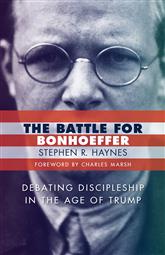 So this new Eerdmans book is asking about all of that, how the great life of a great thinker and faithful pastor might motivate us to be faithful within the quandaries and challenges of our own civic life these days.
So this new Eerdmans book is asking about all of that, how the great life of a great thinker and faithful pastor might motivate us to be faithful within the quandaries and challenges of our own civic life these days.
If this helps even a bit, pushing us to consider a coherent and faithful political theology it will be worth it, as we need all the help we can get. (Sadly, not nearly enough have grappled with the remarkable third volume in James K. A. Smith’s “Cultural Liturgies” series, Awaiting the King: Reforming Public Theology.)
Battle for Bonhoeffer closes with what Professor Haynes entitles “Your Bonhoeffer Moment: An Open Letter to Those Who Love Bonhoeffer but (Still) Support Trump.” It is going to generate discussion, I’m sure.
The Battle for Bonhoeffer: will inform you about Dietrich Bonhoeffer, it will help you understand the different interpretations and schools of thought that have used (or rejected) or adopted him, and, in so doing, will press the question of how this sort of engaged, public theology might inform us for our own faithfulness in these times. The subtitle seems appropriate: Debating Discipleship in an Age of Trump.
Click here for a great short piece “5 Questions with Stephen R Haynes.” Then come back and order the book from us!
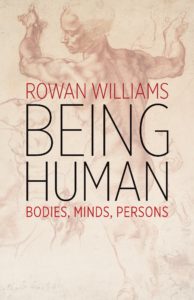 Being Human: Bodies, Minds, Persons Rowan Williams (Eerdmans) $12.00 Many of our BookNotes readers will at least know who Rowan Williams is. For those that might not yet be familiar with him, he’s a very important British theologian, an Anglican priest and thinker who a few years ago was the worldwide Anglican communion’s closest equivalent to a figurehead, their Archbishop of Canterbury. After being the 104th leader to be elected to Archbishop of the Church of England (from 2002 – 2012) Williams has become the Master of Magdalene College at the University of Cambridge. He has written widely, in varied themes from St. Augustine to contemporary politics, from linguist theory to contemplative spirituality to the study of history and why it matters. It is amazing the sorts of things he is able to write about and everyone who relates to him is impressed with his humility and congeniality and his deep knowledge of the broad, global, Christian tradition. He is a pastor/scholar and a globally recognized public intellectual.
Being Human: Bodies, Minds, Persons Rowan Williams (Eerdmans) $12.00 Many of our BookNotes readers will at least know who Rowan Williams is. For those that might not yet be familiar with him, he’s a very important British theologian, an Anglican priest and thinker who a few years ago was the worldwide Anglican communion’s closest equivalent to a figurehead, their Archbishop of Canterbury. After being the 104th leader to be elected to Archbishop of the Church of England (from 2002 – 2012) Williams has become the Master of Magdalene College at the University of Cambridge. He has written widely, in varied themes from St. Augustine to contemporary politics, from linguist theory to contemplative spirituality to the study of history and why it matters. It is amazing the sorts of things he is able to write about and everyone who relates to him is impressed with his humility and congeniality and his deep knowledge of the broad, global, Christian tradition. He is a pastor/scholar and a globally recognized public intellectual.
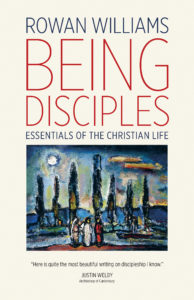
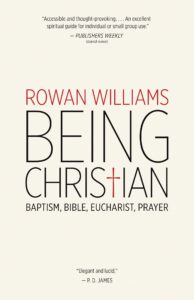 A few years ago Eerdmans started a little series of books by Rowan Williams and Being Human is the third in the trilogy. The first two were quite popular and remain good sellers in the right circles, ideal for those who want a succinct, intellectually stimulating introduction to basic Christian truths as understood within the broadly mainline denominations. The first was Being Christian: Baptism, Bible, Eucharist, Prayer (Eerdmans; $10.00) and the second was Being Disciples: Essentials of the Christian Life (Eerdmans; $10.00.) This brand new third volume – Being Human — continues this style of gracious, engaging prose about the things that matter most.
A few years ago Eerdmans started a little series of books by Rowan Williams and Being Human is the third in the trilogy. The first two were quite popular and remain good sellers in the right circles, ideal for those who want a succinct, intellectually stimulating introduction to basic Christian truths as understood within the broadly mainline denominations. The first was Being Christian: Baptism, Bible, Eucharist, Prayer (Eerdmans; $10.00) and the second was Being Disciples: Essentials of the Christian Life (Eerdmans; $10.00.) This brand new third volume – Being Human — continues this style of gracious, engaging prose about the things that matter most.
Alas, this one may not be quite as appealing, but we can sure hope that it is – after the knowledge of God and knowing what it means to be a follower of Jesus, what could be more important than knowing who we are? It is said by many great writers and thinkers – my friend Steve Garber comes to mind, immediately, but also black activist Lisa Sharon Harper and culture-maker Andy Crouch and “wounded heart” therapist Dan Allender – that most of the big questions (in philosophy, politics, ethics, science, and certainly in the arts and literature) emerge from our understanding of the human person and the human condition. Of Walsh & Middleton’s famous four worldview questions described in their classic Transforming Vision the second foundational question is “who are we?” Some use the technical phrase “anthropology” for this – the study of the human person — and theological anthropology is a hot scholarly topic these days.
With talk about trans-humanism and all the bioengineering advances and AI, even – not to mention questions about transgendered persons and medical ethics – anthropology is an urgent, practical concern. One of the great books that came out last year about this is Jeffrey Brauch’s Flawed Perfection: What It Means to Be Human and Why It Matters for Culture, Politics, and Law (Lexham; $15.99.) Even Wendell Berry has a collection of essays What Are People For? (Counterpoint; $15.95.)
It shouldn’t surprise us, then, that the Rev. Dr. Williams jumps into this discussion because, again, he seems to be nearly an icon (wait, he has a book on icons!) for socially-relevant Christian thinking; ancient truths for contemporary living, public theology for the common good, etcetera. Offering coherent, thoughtful, Christian wisdom for thinking about things like contemporary science, human origins, medical ethics, the nature of bodies, and such, is so, so needed.
As it says on the back cover:
In this deeply engaging exploration of what it means to be human, Rowan Williams addresses such questions with lucid meditations that draw on insights from neuroscience, philosophy, psychology, and literature. He then probes the relations of faith to human flourishing and shows how a traditional Christian practice – namely, silence – can help us realize our fullest human potential.
Well, I bet you didn’t see that coming, did you? I didn’t. Here is a book by a public intellectual deeply rooted in faith and theology writing about the meaning of consciousness and raising questions about whether the mind is merely a machine. What makes us a person, after all? What does it mean to be embodied? What is the relationship between our bodies and our minds?
And he ends up talking about silence.

Well, like I said, Being Human by Rowan Williams is short and lucid and really, really stimulating. Happily, I notice he draws on the wonderfully big ideas of The Master and His Emissary by Ian McGilchrist. He quotes Kierkegaard and neuroscientists and practitioners of silence like Maggie Ross. I think some of these chapters were adapted from lectures (at places like St. Andrews and Durham and Westminster Abby) so they are necessarily meaty, but elegant. Like the others in the trilogy, it weighs in at not much more than 100 pages. This is a really nice book for anyone curious about this huge question, for readers who want sagacious ruminations on what it means to be a person by the beloved former Primate. Many loved Being Christian and Being Disciples and, now, will want to add Being Human to complete the set.
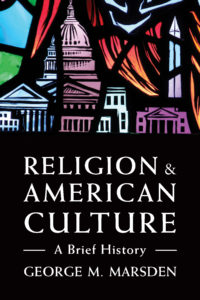 Religion & American Culture: A Brief History George M. Marsden (Eerdmans) $30.00 Yep, we shelled out a lot of dough to order these for our store, but I am convinced that any bookstore worth its salt should have cultural studies and history and anything written by George Mardsen, Christian historian par excellence. (Indeed, Professor John Fea calls him “one of our generation’s greatest American religious historians.”)
Religion & American Culture: A Brief History George M. Marsden (Eerdmans) $30.00 Yep, we shelled out a lot of dough to order these for our store, but I am convinced that any bookstore worth its salt should have cultural studies and history and anything written by George Mardsen, Christian historian par excellence. (Indeed, Professor John Fea calls him “one of our generation’s greatest American religious historians.”)
To learn that Dr. Marsden has been re-working an older textbook, updating and making it more popular, even calling is a “brief” history (I suppose the term is relative, with this being over 275 pages) it was just music to my ears. We are so thrilled that it is now released and we are counting on our astute Hearts & Minds fans and BookNotes readers to pick this up.
What a hugely important thing, this study of the relationship between history and cultures and cultures and religion… How did faith (and whose faiths?) shape US history? How do we understand and appreciate the flow of one era in American history (so to speak) to the next? What is at the core of American culture, and its relationship to religiosity? Why is America so religious and yet so oddly, well, not. You see, this is about the grand shifts and undercurrents, the flow of ideas and how they influenced cultural customs and trends and values.
This, I believe, is a book that will illuminate our own days and the trends of our times.
Here is some info about Religion & American Culture: A Brief History from the Eerdmans publishing promotion:
While Americans still profess to be one of the most religious people in the industrialized world, many aspects of American culture have long been secular and materialistic. That is just one of the many paradoxes, contradictions, and surprises in the relationship between Christianity and American culture. In this book George Marsden, a leading historian of American Christianity and award-winning author, tells the story of that relationship in a concise and thought-provoking way.
Surveying the history of religion and American culture from the days of the earliest European settlers right up through the elections of 2016, Marsden offers the kind of historically and religiously informed scholarship that has made him one of the nation’s most respected and decorated historians. Students in the classroom and history readers of all ages will benefit from engaging with the story Marsden tells.
Better, listen to Dr. Marsden talk about it:
As the title to my book suggests, this story focuses on the mutual interactions between the major religious forces in American history and the broader cultural forces. Though it provides the basic information necessary to understand the differences among the various religious dynamics, it is not a conventional religious history that focuses mostly on religious institutions, and on the details of their leadership, theologies, programs and developments. Rather it is my attempt, drawn from over a half century of reflection on the fascinating religious and cultural interactions, to put the story in a helpful interpretive framework.
The United States is an amazingly religious place. Yet it is simultaneously a remarkably profane and materialistic place. Trying to understand that paradox provides one of the central and most fascinating themes in this analysis. The culture reshapes the religion even as the religion helps shape the culture. So I include a good bit of material attempting to draw on the best insights into the cultural dynamics and intellectual trends and assumptions that have been most characteristic in various eras of American life.
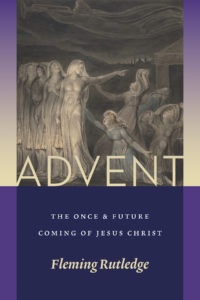 Advent: The Once & Future Coming of Jesus Christ Fleming Rutledge (Eerdmans) $30.00 I wish I had more time to spend some time with this so I could tell you the glories of it. I’m afraid I am going to have to be very brief, because I just can’t imagine how to explain this other than the bare basics.
Advent: The Once & Future Coming of Jesus Christ Fleming Rutledge (Eerdmans) $30.00 I wish I had more time to spend some time with this so I could tell you the glories of it. I’m afraid I am going to have to be very brief, because I just can’t imagine how to explain this other than the bare basics.
You know, I hope, that Fleming Rutledge is nothing short of a hero to many – thoughtful, intellectually stimulating, a rigorous scholar and, until recently a working pastor in her Episcopal parish in New York City.
We have long appreciated her (thanks to an Eerdmans sales rep years ago who pressed a copy of an early book into my hands.) Beth and I have met her more than once and she’s an extraordinary presence. Her 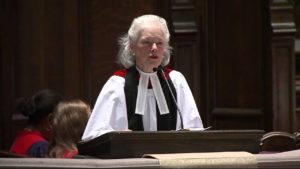 theological rigor is seen in the remarkable work The Crucifixion, her fascinating (and very Biblical) preaching is seen in a large collection of sermons on Romans, while yet another draws on the old saying about preaching with the newspaper in the other hand; it is simply called The Bible and the New York Times and only a preacher as eloquent and elegant and as bold and cultured as Rutledge could pull it off
theological rigor is seen in the remarkable work The Crucifixion, her fascinating (and very Biblical) preaching is seen in a large collection of sermons on Romans, while yet another draws on the old saying about preaching with the newspaper in the other hand; it is simply called The Bible and the New York Times and only a preacher as eloquent and elegant and as bold and cultured as Rutledge could pull it off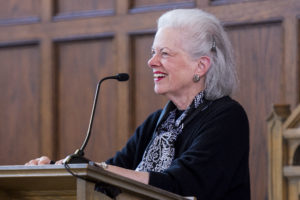
My favorite book of hers is a remarkable work to read during Lent called The Undoing of Death: Sermons for Holy Week and Easter.
Like that one, Advent: The Once and Future Coming of Jesus Christ is largely a collection of sermons preached over a lifetime of Advents, a collection selected and well edited, making it a major contribution to Advent materials; this nearly is a publishing event! However, there are some extra delights in here as well – four solid chapters which were originally essays or articles, such as a five-part Advent series that appeared in the Christian Century (I had clipped some of those!) and there are several of what she calls “Pre-Advent.” There are a few on “God’s Apocalyptic War” which were preached on the Feast of Saint Michael. At the conclusion there is a Service of Lessons and Carols on the Great “O” Antiphons. I can’t wait until the right time of the year to read that, starting, I might add, on page 393. Whew, what a fabulous collection, a book that you will use for years to come.
I can’t list all the many, many sermons, even the groupings, but I can assure you they are vivid, meaty, and move us to be active in awaiting the coming of the King – the in-between times of “already but not yet.” These are surely striking, gutsy, Biblical and potent. I waver to suggest there is nothing like it in print.
Here are just a few of the many rave endorsements that grace the inside pages:
Richard B. Hays
— Duke University
“Fleming Rutledge’s Advent preaching bursts upon us with the same elemental force as the preaching of John the Baptist. Rutledge’s fine crafting of language may be subtler than John’s, but she carries forward his incisive, apocalyptic message of judgment and hope. This is essential preaching for a church wallowing in self-referential sentimentality and caught in captivity to the compromises of the present political order. This is preaching that tells the truth about the world’s suffering and proclaims that God acts to rescue us. Do not drift anesthetized through another season of Advent; read this book.”
Marilyn McEntyre
— author of Caring for Words in a Culture of Lies and What’s in a Phrase?
“Replete with rich, mature, vigorous theological reflections on Advent, this book is invigorating–edgy, intelligent, unflinching, and joyful in all it reclaims. A timely, lively prophetic word.”
Alan Jacobs
— Baylor University
“Advent is the most complex of the church’s seasons, with its remembrance of God’s former mercies and its looking forward in trust in God’s promises. Fleming Rutledge’s wonderful sermons on Advent are more than individual gems (though they are that): collectively they provide a rich and full exploration of the season in all its manifold moods and themes. This book is the perfect companion to the beginning of any church year.”
James K. A. Smith
— Calvin College
“My not-so-secret hope is that Fleming Rutledge’s Advent would become required reading in our seminaries and the focus of vestry book clubs, elder retreats, and worship leader workshops. Because that would give me hope for an apocalyptic renewal in the church–that we would learn again how to live as an Advent people, hoping in a God who acts and is making all things new. Taking this book to heart would teach us how to live wisely, faithfully, and prophetically in the Time Between.”
Wesley Hill
— Trinity School for Ministry
“Many of us in the American church are addicted to preaching that makes us, the hearers, into the heroes. We listen to sermons to receive advice–about how we can do better or we can try harder or we can be stronger in this or that aspect of Christian life. For all of us suffering this theological addiction, Rutledge’s Advent: The Once and Future Coming of Jesus Christ is the rehab program we need. God is the saving agent here, and God’s coming in Jesus Christ to dismiss our efforts at self-justification is the recurring theme. Reading this book liberates us to enjoy a new theological sobriety.”
Jo Bailey Wells
— Bishop of Dorking
“Fleming Rutledge has to be one of the most daring preachers I know. With moral courage and intellectual rigor she tackles challenging texts and nagging questions. She is unafraid to proclaim the truth that may hurt–because that same truth sets us free. I have squirmed, yet I am stretched–to deeper faith, to higher hope, to broader love.”
Michael J. Gorman
— St. Mary’s Seminary & University, Baltimore
“Whatever you previously thought or said about Advent (and ‘pre-Advent’), this book will both challenge and deepen your understanding in ways never anticipated. For Fleming Rutledge, Advent is not merely preparation for Christmas, much less ‘the most wonderful time of the year.’ It is, rather, the season of difficult yet hopeful watching, waiting, and participating–the season that encapsulates the Christian life between Christ’s first and second comings. Like Scripture itself, these are words to read and inwardly digest.”

BookNotes

SPECIAL
DISCOUNT
ANY BOOK MENTIONED
20% OFF
order here
this takes you to the secure Hearts & Minds order form page
just tell us what you want
inquire here
if you have questions or need more information
just ask us what you want to know
Hearts & Minds 234 East Main Street Dallastown PA 17313
read@heartsandmindsbooks.com
717-246-3333

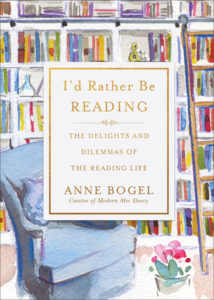 I’d Rather Be Reading: The Delights and Dilemmas of the Reading Life Anne Bogel (Baker Books) $14.99 Oh my, a small gift-type book, compact sized and slim, that is jam-packed full of advice about reading, making a winsome (but not weak) case for reading widely. Bogel admits to being a “certified book nerd” and I’m sure you will love to spend some time with her by looking over her shoulder in this brand new book of bookish ruminations. What a great, great little book this is!
I’d Rather Be Reading: The Delights and Dilemmas of the Reading Life Anne Bogel (Baker Books) $14.99 Oh my, a small gift-type book, compact sized and slim, that is jam-packed full of advice about reading, making a winsome (but not weak) case for reading widely. Bogel admits to being a “certified book nerd” and I’m sure you will love to spend some time with her by looking over her shoulder in this brand new book of bookish ruminations. What a great, great little book this is!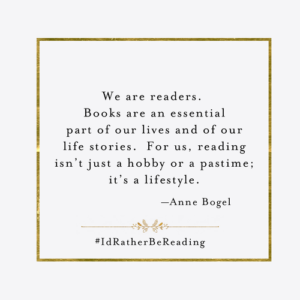 Anne Bogel’s new book will assure any such book addicts that they are not alone. And that we don’t have to be ashamed of our tastes and interests. In fact, after this faux-confessions bit, the second chapter is called “The Books That Find You.” Indeed – another reason I am wont to name more than just one or two books when somebody asks – after nearly 40 years of promoting books and reading, I still usually don’t quite know what exact book matches which exact reader. There’s mystery and magic to all this, and I do trust that God, perhaps disguised as a muse, working through a sales pitch or book review or BookNotes column, or a well designed book cover, helps the right book get to the person that needs it most. As midwives to this glorious process, we booksellers, reviewers, and literary cheerleaders, can’t take credit for the goodness that is birthed when a book finally finds its reader.
Anne Bogel’s new book will assure any such book addicts that they are not alone. And that we don’t have to be ashamed of our tastes and interests. In fact, after this faux-confessions bit, the second chapter is called “The Books That Find You.” Indeed – another reason I am wont to name more than just one or two books when somebody asks – after nearly 40 years of promoting books and reading, I still usually don’t quite know what exact book matches which exact reader. There’s mystery and magic to all this, and I do trust that God, perhaps disguised as a muse, working through a sales pitch or book review or BookNotes column, or a well designed book cover, helps the right book get to the person that needs it most. As midwives to this glorious process, we booksellers, reviewers, and literary cheerleaders, can’t take credit for the goodness that is birthed when a book finally finds its reader.
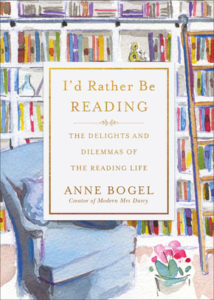 And now, I’d Rather Be Reading: The Delights and Dilemmas of the Reading Life by Anne Bogel must be added to that short list – I could list more if you really wanted – of must-read books about books and the reading life. I’d Rather Be Reading is short, light-hearted at times, even clever, but very smart. A friend of mine suggested to Ms Bogel that she request the publisher put a picture of her own favorite reading chair on the cover, and it has a soft, living room feel that is inviting. But yet, I suspect that Bogel isn’t all that highbrow or bourgeois; I bet she reads so widely that she has a book with her wherever she goes and will plunk herself down whenever and wherever she can. She invites us to read widely and well, even if we don’t have a library in our home or a big comfy chair. She even addresses this a bit in a chapter called “Bookworm Problems.” I bet many of our best Hearts & Minds friends and customers will relate.
And now, I’d Rather Be Reading: The Delights and Dilemmas of the Reading Life by Anne Bogel must be added to that short list – I could list more if you really wanted – of must-read books about books and the reading life. I’d Rather Be Reading is short, light-hearted at times, even clever, but very smart. A friend of mine suggested to Ms Bogel that she request the publisher put a picture of her own favorite reading chair on the cover, and it has a soft, living room feel that is inviting. But yet, I suspect that Bogel isn’t all that highbrow or bourgeois; I bet she reads so widely that she has a book with her wherever she goes and will plunk herself down whenever and wherever she can. She invites us to read widely and well, even if we don’t have a library in our home or a big comfy chair. She even addresses this a bit in a chapter called “Bookworm Problems.” I bet many of our best Hearts & Minds friends and customers will relate.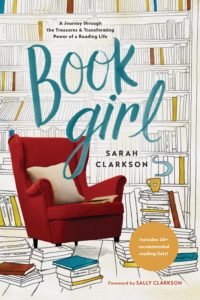 Book Girl: A Journey Through the Treasures & Transforming Power of a Reading Life Sarah Clarkson (Tyndale) $15.99 I am both thrilled and a tad frustrated that this spectacular book just came last week – it is one of three brand new books on reading that came out from Christian publishers this month and any one of them would be worthy of an excited announcement and a big push. With the understandably big buzz of Karen Swallow Prior’s weighty work on virtue formation by reading (you know we’re bringing her to Hearts & Minds this Friday night to discuss On Reading Well) and the charming I’d Rather Be Reading by podcast queen Anne Bogel, I certainly don’t want Sarah Clarkson’s amazing new book to get lost in the shuffle. It is so, so good, and you need to know about it. In a way, this book is close to what I often do when I give presentations on the value of reading and the role of reading in Christian discipleship and the joys of the reading life so I can say that I think (ahem!) that it is very, very important and stuff that needs to be said. It has a distinctively female take – it’s called Book Girl after all – but this book boy loved it and wants to recommend it with gusto. Male or female, you should get Book Girl right away, and an extra one to give away as a gift.
Book Girl: A Journey Through the Treasures & Transforming Power of a Reading Life Sarah Clarkson (Tyndale) $15.99 I am both thrilled and a tad frustrated that this spectacular book just came last week – it is one of three brand new books on reading that came out from Christian publishers this month and any one of them would be worthy of an excited announcement and a big push. With the understandably big buzz of Karen Swallow Prior’s weighty work on virtue formation by reading (you know we’re bringing her to Hearts & Minds this Friday night to discuss On Reading Well) and the charming I’d Rather Be Reading by podcast queen Anne Bogel, I certainly don’t want Sarah Clarkson’s amazing new book to get lost in the shuffle. It is so, so good, and you need to know about it. In a way, this book is close to what I often do when I give presentations on the value of reading and the role of reading in Christian discipleship and the joys of the reading life so I can say that I think (ahem!) that it is very, very important and stuff that needs to be said. It has a distinctively female take – it’s called Book Girl after all – but this book boy loved it and wants to recommend it with gusto. Male or female, you should get Book Girl right away, and an extra one to give away as a gift. many of the strict and formulaic parenting books that helped us focus on the family in those years. (And I wonder if she is related to the 1970s era Eerdmans author Margaret Clarkson?) I recall her writing about family and marriage and pain and suffering in a voice that was thoughtful and wise, deep without being arcane. I think some linked her (or at least I do in my own mind) to C.S. Lewis and Francis & Edith Schaeffer, maybe to the likes of Luci Shaw and Madeline L’Engle. That is, she was theologically interesting and intelligent and artful. And now, she has a handful of books written with Sarah (such as The Life Giving Parent and The Life Giving Home.)
many of the strict and formulaic parenting books that helped us focus on the family in those years. (And I wonder if she is related to the 1970s era Eerdmans author Margaret Clarkson?) I recall her writing about family and marriage and pain and suffering in a voice that was thoughtful and wise, deep without being arcane. I think some linked her (or at least I do in my own mind) to C.S. Lewis and Francis & Edith Schaeffer, maybe to the likes of Luci Shaw and Madeline L’Engle. That is, she was theologically interesting and intelligent and artful. And now, she has a handful of books written with Sarah (such as The Life Giving Parent and The Life Giving Home.) Oh my, it seems like she’s been listening in on some of my stock lectures on this stuff – ha! But she says it better; I loved Book Girl. Now, we can learn how much more there is to say about these benefits of books and the value of the reading life. There is so much good wisdom in here that I think anyone who likes to read and learn and grow will be underlining phrases and highlighting whole pages. Those of us who are confident this is important for the advancement of God’s Kingdom will want to share this with others. I think you could adapt the points and use them to teach others about the value of cultivating serious reading habits.
Oh my, it seems like she’s been listening in on some of my stock lectures on this stuff – ha! But she says it better; I loved Book Girl. Now, we can learn how much more there is to say about these benefits of books and the value of the reading life. There is so much good wisdom in here that I think anyone who likes to read and learn and grow will be underlining phrases and highlighting whole pages. Those of us who are confident this is important for the advancement of God’s Kingdom will want to share this with others. I think you could adapt the points and use them to teach others about the value of cultivating serious reading habits.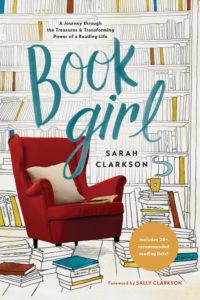 much here that I love that I want to just shout from the rooftop. Book Girl offers good, good content, intelligent but not daunting. It’s not only reassuring and so nice to hear her passion for good books and reading widely, but I think it is truly vital, giving us words and talking points to convince others about the value of books and the importance of study. I’m hoping you take me literally here – we all know folks who don’t read much and we also know people who wish they’d read more, but just can’t find the time, energy, or motivation. Book Girl will inspire them. You should give her book away and, at least, master her talking points about the value of the printed page.
much here that I love that I want to just shout from the rooftop. Book Girl offers good, good content, intelligent but not daunting. It’s not only reassuring and so nice to hear her passion for good books and reading widely, but I think it is truly vital, giving us words and talking points to convince others about the value of books and the importance of study. I’m hoping you take me literally here – we all know folks who don’t read much and we also know people who wish they’d read more, but just can’t find the time, energy, or motivation. Book Girl will inspire them. You should give her book away and, at least, master her talking points about the value of the printed page.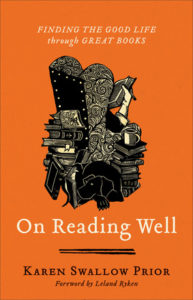 On Reading Well: Finding the Good Life Through Great Books Karen Swallow Prior (Brazos Press) $19.99 I have written about this before, announcing it before it came out and just last week
On Reading Well: Finding the Good Life Through Great Books Karen Swallow Prior (Brazos Press) $19.99 I have written about this before, announcing it before it came out and just last week 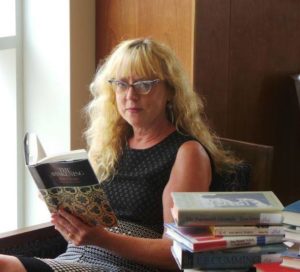 Tale of Two Cities, even The History of Tom Jones which is one of the early Victorian novels that attempted to bring moral meaning to the contemporary novel) and fairly contemporary ones, from Gatsby, a few short stories by George Saunder’s to the vivid, dark stories of Cormac McCarthy. (Her piece on the virtue of hope in The Road is fantastic, by the way!) This is most of what you need to know to enjoy and learn from On Reading Well — she links a particular virtue such as temperance, prudence, faith, kindness, or, patience to a particular novel or short story. What’s not to like about learning courage from Jim in The Adventures of Huckleberry Finn or chastity from Edith Wharton, humility from Flannery O’Connor, or faith from the hard story of persecuted monks in Endo’s profound work, Silence. And wait ‘til you see what she does with Persuasion by Jane Austen that, for full disclosure, I’ve never read. You?
Tale of Two Cities, even The History of Tom Jones which is one of the early Victorian novels that attempted to bring moral meaning to the contemporary novel) and fairly contemporary ones, from Gatsby, a few short stories by George Saunder’s to the vivid, dark stories of Cormac McCarthy. (Her piece on the virtue of hope in The Road is fantastic, by the way!) This is most of what you need to know to enjoy and learn from On Reading Well — she links a particular virtue such as temperance, prudence, faith, kindness, or, patience to a particular novel or short story. What’s not to like about learning courage from Jim in The Adventures of Huckleberry Finn or chastity from Edith Wharton, humility from Flannery O’Connor, or faith from the hard story of persecuted monks in Endo’s profound work, Silence. And wait ‘til you see what she does with Persuasion by Jane Austen that, for full disclosure, I’ve never read. You?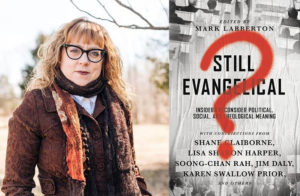 Wheaton, except for the presence of remarkable staff like her.) She carries the banner for evangelicalism well and tells about it nicely in her excellent and enjoyable testimony of why she still identifies as evangelical in her chapter in Still Evangelical? Insiders Reconsider Political, Social, and Theological Meaning (IVP; $17.00.) It’s a book I’ve been trying to get people both evangelical and not to read. Her piece therein is solid and inspiring.
Wheaton, except for the presence of remarkable staff like her.) She carries the banner for evangelicalism well and tells about it nicely in her excellent and enjoyable testimony of why she still identifies as evangelical in her chapter in Still Evangelical? Insiders Reconsider Political, Social, and Theological Meaning (IVP; $17.00.) It’s a book I’ve been trying to get people both evangelical and not to read. Her piece therein is solid and inspiring.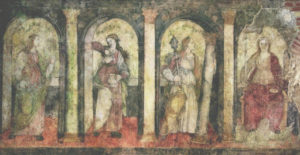 The way in which virtue is discussed – cardinal virtues and theological ones and heavenly ones — offers a big nod to a big tradition, but unless one likes that sort of accommodation to that particular way of telling the story of virtues, it might be a little curious. I suppose this might be a criticism (although for me it is a more inchoate instinct of concern and not a developed critique) but I note it here mostly as a heads up; you will benefit greatly from reading the first chapter which nicely summarizes this sort of virtue theory work, but it does draw on Aristotle and that ancient, classical language and taxonomy of virtue. I wondered why she didn’t at least bring Stanley Hauerwas into the conversation.
The way in which virtue is discussed – cardinal virtues and theological ones and heavenly ones — offers a big nod to a big tradition, but unless one likes that sort of accommodation to that particular way of telling the story of virtues, it might be a little curious. I suppose this might be a criticism (although for me it is a more inchoate instinct of concern and not a developed critique) but I note it here mostly as a heads up; you will benefit greatly from reading the first chapter which nicely summarizes this sort of virtue theory work, but it does draw on Aristotle and that ancient, classical language and taxonomy of virtue. I wondered why she didn’t at least bring Stanley Hauerwas into the conversation.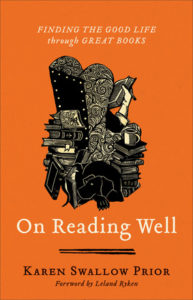 Firstly, Prior just loves these stories. I know this from other writing that she has done (more on that in a minute) and I wish it came through even more clearly in the book, although it does come through nicely. My hunch is she’s being a bit professorial and wanting to guide readers to discover the joys of reading the story – and the process, the art, of allowing the stores to shape them for the better – for themselves. She doesn’t gush, much, but Dr. Prior is a lover of literature, par excellence, and she trusts the stories are artful and powerful enough to do their thing on open-hearted readers. She is a bit nerdy (especially about Victorian stuff) and this passion for the printed page should inspire us all. She ends her introduction with the lines of Puritan Richard Baxter who says,“Good books are a very great mercy to the world.” It is good to be in conversation with someone who knows this so deeply in her bones.
Firstly, Prior just loves these stories. I know this from other writing that she has done (more on that in a minute) and I wish it came through even more clearly in the book, although it does come through nicely. My hunch is she’s being a bit professorial and wanting to guide readers to discover the joys of reading the story – and the process, the art, of allowing the stores to shape them for the better – for themselves. She doesn’t gush, much, but Dr. Prior is a lover of literature, par excellence, and she trusts the stories are artful and powerful enough to do their thing on open-hearted readers. She is a bit nerdy (especially about Victorian stuff) and this passion for the printed page should inspire us all. She ends her introduction with the lines of Puritan Richard Baxter who says,“Good books are a very great mercy to the world.” It is good to be in conversation with someone who knows this so deeply in her bones. because she is a representative of evangelical faith communities for the Humane Society and has written stuff about treating animals with dignity. (She has a chapter in Every Living Thing, an anthology attempting to bring a variety of religious voices into the conversation about animal well-being.) Being green seems to be a red flag for some. Or because she has arranged conversations to bring together in civil discourse those who are pro-life and those that are pro-choice. That she is a thoughtful, moderate, socially-engaged evangelical woman — she works with guys like Russell Moore and Daniel Darling, recent author of The Dignity Revolution, in the public policy division of her denomination – has made her a lightning rod for much spiteful opposition.
because she is a representative of evangelical faith communities for the Humane Society and has written stuff about treating animals with dignity. (She has a chapter in Every Living Thing, an anthology attempting to bring a variety of religious voices into the conversation about animal well-being.) Being green seems to be a red flag for some. Or because she has arranged conversations to bring together in civil discourse those who are pro-life and those that are pro-choice. That she is a thoughtful, moderate, socially-engaged evangelical woman — she works with guys like Russell Moore and Daniel Darling, recent author of The Dignity Revolution, in the public policy division of her denomination – has made her a lightning rod for much spiteful opposition.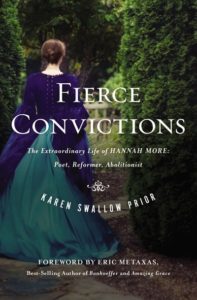 Fierce Convictions: The Extraordinary Life of Hannah More Karen Swallow Prior (Thomas Nelson) $24.99 I so enjoyed Eric Metaxas’s fabulous, energetic foreword to Fierce Convictions, Karen Swallow Prior’s marvelous and important biography of 18thcentury British abolitionist Hannah More, where Metaxas writes about almost wanting to stop his research on Wilberforce (that gave us the book Amazing Grace) to focus on Hannah More. As he tells it, he only could pray that somebody else would soon take on this gargantuan job, writing the first major biography of this amazing pre-Victorian writer and public voice for social justice. It speaks volumes that Karen Swallow Prior – who loves books so much, but also has this desire to see evangelical faith as an agent for good in the world – took up the task. Her Fierce Convictions isn’t precisely about virtue, but, oh my, what a virtuous woman Hannah More was. And how influential. In Prior’s hands, this More biography makes history come to life and shows us what the “end game” of all this talk about “the good life” is all about.
Fierce Convictions: The Extraordinary Life of Hannah More Karen Swallow Prior (Thomas Nelson) $24.99 I so enjoyed Eric Metaxas’s fabulous, energetic foreword to Fierce Convictions, Karen Swallow Prior’s marvelous and important biography of 18thcentury British abolitionist Hannah More, where Metaxas writes about almost wanting to stop his research on Wilberforce (that gave us the book Amazing Grace) to focus on Hannah More. As he tells it, he only could pray that somebody else would soon take on this gargantuan job, writing the first major biography of this amazing pre-Victorian writer and public voice for social justice. It speaks volumes that Karen Swallow Prior – who loves books so much, but also has this desire to see evangelical faith as an agent for good in the world – took up the task. Her Fierce Convictions isn’t precisely about virtue, but, oh my, what a virtuous woman Hannah More was. And how influential. In Prior’s hands, this More biography makes history come to life and shows us what the “end game” of all this talk about “the good life” is all about.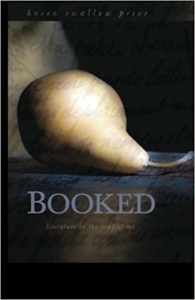 Booked: Literature in the Soul of Me Karen Swallow Prior (T.S. Poetry Press) $17.99 I mentioned Karen Swallow Prior’s true love of books. Like her page-turning sisters mentioned above, Anne Bogel (I’d Rather Be Reading) and Sarah Clarkson (Book Girl), she’s smitten. Is the Pope Catholic? Wowza, this is so true, and it is abundantly, beautifully, clear in her creative memoir, Booked: Literature in the Soul of Me. I have told you about that before, over the years, celebrating that she came up with this delicious idea of doing a memoir – her own memories of her growing up and into young adulthood – by way of describing a book that meant the most to her in that era of her life. What a grand idea, an autobiographical survey of the books that she loved or that had influenced her, season by season, through her (shall we say?) ups and downs. Many of us could draw up such a table of contents, at least – that would be a fun experiment, no? (for me it would also be the record albums that were playing year by year) — but few could pull off such a project as gracefully and with such solid, wise, insight as Prior.
Booked: Literature in the Soul of Me Karen Swallow Prior (T.S. Poetry Press) $17.99 I mentioned Karen Swallow Prior’s true love of books. Like her page-turning sisters mentioned above, Anne Bogel (I’d Rather Be Reading) and Sarah Clarkson (Book Girl), she’s smitten. Is the Pope Catholic? Wowza, this is so true, and it is abundantly, beautifully, clear in her creative memoir, Booked: Literature in the Soul of Me. I have told you about that before, over the years, celebrating that she came up with this delicious idea of doing a memoir – her own memories of her growing up and into young adulthood – by way of describing a book that meant the most to her in that era of her life. What a grand idea, an autobiographical survey of the books that she loved or that had influenced her, season by season, through her (shall we say?) ups and downs. Many of us could draw up such a table of contents, at least – that would be a fun experiment, no? (for me it would also be the record albums that were playing year by year) — but few could pull off such a project as gracefully and with such solid, wise, insight as Prior.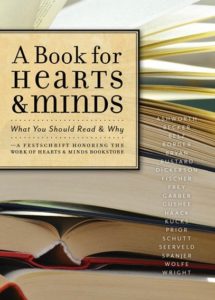 The book is called A Book for Hearts & Minds: What You Should Read & Why – A Festchrift Honoring The Work of Hearts & Minds Bookstore (Square Halo Books; $18.99) and I suppose it’s fair to say we are one of the only places that stocks this anthology of great chapters about great books. What other book has Calvin Seerveld and Ned Bustard, N.T. Wright and David Gushee, Matthew Dickerson and Steve Garber, chapters on the best books about the Bible and cookbooks and poetry and urban planning and history and fantasy and creation-care and film more?
The book is called A Book for Hearts & Minds: What You Should Read & Why – A Festchrift Honoring The Work of Hearts & Minds Bookstore (Square Halo Books; $18.99) and I suppose it’s fair to say we are one of the only places that stocks this anthology of great chapters about great books. What other book has Calvin Seerveld and Ned Bustard, N.T. Wright and David Gushee, Matthew Dickerson and Steve Garber, chapters on the best books about the Bible and cookbooks and poetry and urban planning and history and fantasy and creation-care and film more?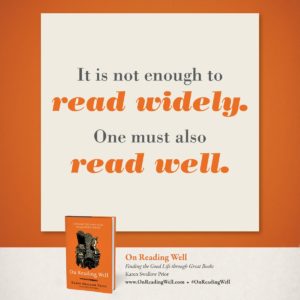

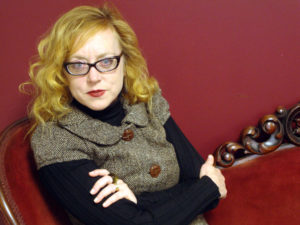 This coming Friday evening, September 14th, will be, we hope, a lovely convergence of some out of town fans and some local friends who are all showing up to hear Karen Swallow Prior share about her brand new book On Reading Well: Finding the Good Life Through Great Books (Brazos Press; $19.99.) She’ll start her talk here at 7:00 PM and be with us for a few hours. I can hardly contain myself telling you why hosting Karen is so very
This coming Friday evening, September 14th, will be, we hope, a lovely convergence of some out of town fans and some local friends who are all showing up to hear Karen Swallow Prior share about her brand new book On Reading Well: Finding the Good Life Through Great Books (Brazos Press; $19.99.) She’ll start her talk here at 7:00 PM and be with us for a few hours. I can hardly contain myself telling you why hosting Karen is so very 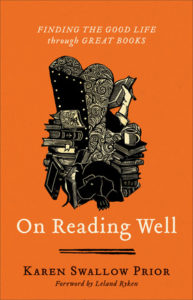 great for us. We pray she has a good time, but we know we sure will! Beth and I and our staff here are thrilled to have her help us understand better what we do. That is, she is going to remind us about the life-changing, culture-reforming, God-honoring, faith-building, power of books and literature. As you can tell from the title and subtitle of her book, Dr. Prior’s thesis is simple but profound: reading good books can help us live well. Great novels, particularly, can help cultivate our character. On Reading Well is as much about character formation, virtue theory, and the nurturing of our interior lives as it is about literature.
great for us. We pray she has a good time, but we know we sure will! Beth and I and our staff here are thrilled to have her help us understand better what we do. That is, she is going to remind us about the life-changing, culture-reforming, God-honoring, faith-building, power of books and literature. As you can tell from the title and subtitle of her book, Dr. Prior’s thesis is simple but profound: reading good books can help us live well. Great novels, particularly, can help cultivate our character. On Reading Well is as much about character formation, virtue theory, and the nurturing of our interior lives as it is about literature.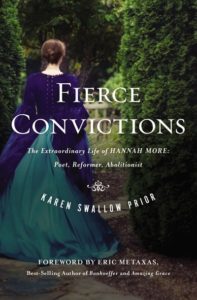 offers faithful public theology for the common good.) She is known for her own memoir Booked and the one-of-a-kind biography of the Victorian-era British abolitionist, great moral activist and novelist Hannah More, Fierce Convictions. She has brought together pro-choice and pro-life folks to talk about common ground and she serves as an evangelical voice within the Humane Society which works (as did Wilberforce and Hannah More) for animal welfare. She teaches lit at Liberty University which makes her that much more interesting to some. That the ecumenical Brazos Press published this book (in hardback, no less) illustrates how important it is and Prior’s own reputation as a significant voice within the broader faith community.The da
offers faithful public theology for the common good.) She is known for her own memoir Booked and the one-of-a-kind biography of the Victorian-era British abolitionist, great moral activist and novelist Hannah More, Fierce Convictions. She has brought together pro-choice and pro-life folks to talk about common ground and she serves as an evangelical voice within the Humane Society which works (as did Wilberforce and Hannah More) for animal welfare. She teaches lit at Liberty University which makes her that much more interesting to some. That the ecumenical Brazos Press published this book (in hardback, no less) illustrates how important it is and Prior’s own reputation as a significant voice within the broader faith community.The da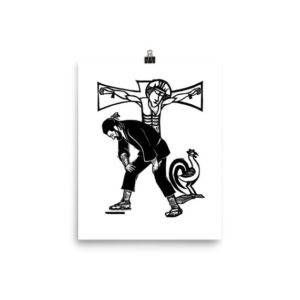 Prior will be doing another event in Lancaster (less than an hour away) on Saturday evening. Learn about the “book launch party” with Prior and see the artwork in On Reading Well done by Square Halo Gallery curator and Lancaster printmaker Ned Bustard
Prior will be doing another event in Lancaster (less than an hour away) on Saturday evening. Learn about the “book launch party” with Prior and see the artwork in On Reading Well done by Square Halo Gallery curator and Lancaster printmaker Ned Bustard 
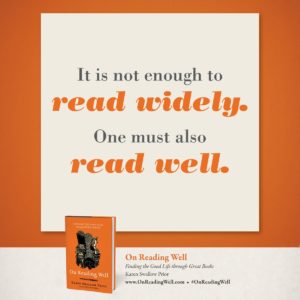
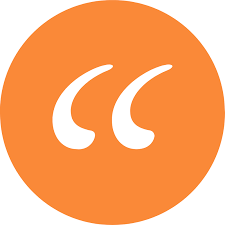
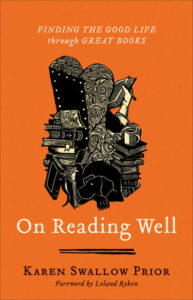
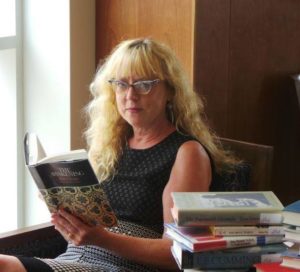 I hope you noticed in our last BookNotes (the one about creatively written, passionate, narrative nonfiction and the value of memoir) that we announced that we are hosting author, college professor, and activist Karen Swallow Prior on September 14th, 2018, to talk about her brand new book On Reading Well: Finding the Good Life Through Great Books. Join us here in Dallastown for what is sure to be a lovely, stimulating evening.
I hope you noticed in our last BookNotes (the one about creatively written, passionate, narrative nonfiction and the value of memoir) that we announced that we are hosting author, college professor, and activist Karen Swallow Prior on September 14th, 2018, to talk about her brand new book On Reading Well: Finding the Good Life Through Great Books. Join us here in Dallastown for what is sure to be a lovely, stimulating evening.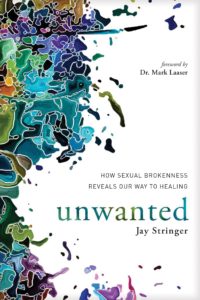 Unwanted: How Sexual Brokenness Reveals Our Way to Healing Jay Stringer (NavPress) $15.99 We are really thrilled and deeply gratified to tell you about this brand new book. We are happy to celebrate its release in part because we knew the author when he was a young adult. His family lived nearby while his father did incredible work at a local church years ago. Many knew even then that Jay was destined for some kind of really thoughtful ministry. It’s nice when a former friend and Dallastown kid gets onto the national stage like this. Stringer has an MDiv. and an LMHC (which is to say he’s an ordained pastor and a licensed therapist) so he’s done some serious scholarship to back up his current private practice and consulting work. (More about that in a moment.)
Unwanted: How Sexual Brokenness Reveals Our Way to Healing Jay Stringer (NavPress) $15.99 We are really thrilled and deeply gratified to tell you about this brand new book. We are happy to celebrate its release in part because we knew the author when he was a young adult. His family lived nearby while his father did incredible work at a local church years ago. Many knew even then that Jay was destined for some kind of really thoughtful ministry. It’s nice when a former friend and Dallastown kid gets onto the national stage like this. Stringer has an MDiv. and an LMHC (which is to say he’s an ordained pastor and a licensed therapist) so he’s done some serious scholarship to back up his current private practice and consulting work. (More about that in a moment.)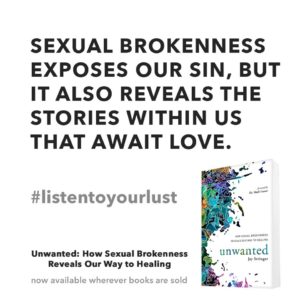 tourniquet on it.” To their credit, many of the standard books designed to help porn-users offer gospel-based grace and the power that comes from surrendering to Christ. They don’t simply recommend we “say no” on our strength, but we allow God to give us fortitude to resist temptations. Although I believe Christian growth – what the theologians call sanctification – is more complicated than cheaply intoning that Luther line about “preaching the gospel to yourself” or insisting that Christ is sufficient, obviously gospel-based trust in Christ’s cross, God’s imputed righteousness, and the gifts and power of the Holy Spirit are essential resources. Of course, we don’t go it alone, and God is with us and promises to help us. True enough.
tourniquet on it.” To their credit, many of the standard books designed to help porn-users offer gospel-based grace and the power that comes from surrendering to Christ. They don’t simply recommend we “say no” on our strength, but we allow God to give us fortitude to resist temptations. Although I believe Christian growth – what the theologians call sanctification – is more complicated than cheaply intoning that Luther line about “preaching the gospel to yourself” or insisting that Christ is sufficient, obviously gospel-based trust in Christ’s cross, God’s imputed righteousness, and the gifts and power of the Holy Spirit are essential resources. Of course, we don’t go it alone, and God is with us and promises to help us. True enough. The data, Stringer insists, is not only intriguing, but also remarkably revealing about what is really going on among men and women who have sexual addictions, endure unwanted fantasies, act out in inappropriate ways, or are deeply involved in pornography and the like. As a clinician and therapist he has heard people talk about their sense of losing their very souls through experiences of trauma. Some have experienced sexual abuse, which has caused lasting pain and corrupted their desires in various ways. The first third of the book, under the unit “How Did I Get Here” draws on amazingly important research and assures us that understanding our unrelenting unwanted behaviors and our deepest stories is important.
The data, Stringer insists, is not only intriguing, but also remarkably revealing about what is really going on among men and women who have sexual addictions, endure unwanted fantasies, act out in inappropriate ways, or are deeply involved in pornography and the like. As a clinician and therapist he has heard people talk about their sense of losing their very souls through experiences of trauma. Some have experienced sexual abuse, which has caused lasting pain and corrupted their desires in various ways. The first third of the book, under the unit “How Did I Get Here” draws on amazingly important research and assures us that understanding our unrelenting unwanted behaviors and our deepest stories is important.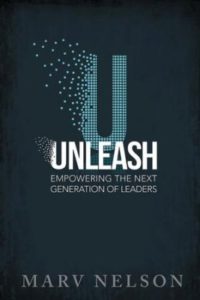 Unleash: Empowering the Next Generation of Leaders Marv Nelson (Abingdon Press) $15.99 Speaking of books written by authors we know and love, this brand new book is by a former youth pastor friend from Pittsburgh. In fact, after a stint doing Middle School ministry and youth work, Marv Nelson worked with young adults and pastored a college and career age, campus church plant near the University of Pittsburgh. A few of my dear CCO friends worked intimately with him and everyone who knows him stands in awe at his genuine care, his kind spirit, his fun and effective approach and his keen ability to serve others even while leading them well. He is a pastor and leader that I greatly admire. We are happy to stock his previous book (good for anyone with doubts or in need of Christian basics, but especially for seekers and skeptics, called What Good is Jesus?)
Unleash: Empowering the Next Generation of Leaders Marv Nelson (Abingdon Press) $15.99 Speaking of books written by authors we know and love, this brand new book is by a former youth pastor friend from Pittsburgh. In fact, after a stint doing Middle School ministry and youth work, Marv Nelson worked with young adults and pastored a college and career age, campus church plant near the University of Pittsburgh. A few of my dear CCO friends worked intimately with him and everyone who knows him stands in awe at his genuine care, his kind spirit, his fun and effective approach and his keen ability to serve others even while leading them well. He is a pastor and leader that I greatly admire. We are happy to stock his previous book (good for anyone with doubts or in need of Christian basics, but especially for seekers and skeptics, called What Good is Jesus?)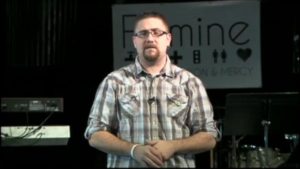 But here is what’s better: this is about leadership development not only within yourself but among others around you. Marv Nelson has a knack for, as they say, investing in others. For pouring into others. (Well, it seems like a knack, just a natural thing, but as this book shows, Marv has thought a lot about how this works and has worked hard to explore what is faithful and effective as he’s sharpened those ministry arts.) Still, he easily calls out the best in others, he invites folks along in his own leadership work, slowly passing the reigns to others; he creates teams and delegates stuff and sets folks up to succeed (or maybe not) always guiding them with care and intentionality. He mentors others and knows how to get the deep stuff said and the good stuff accomplished. This book shows you how it’s done.
But here is what’s better: this is about leadership development not only within yourself but among others around you. Marv Nelson has a knack for, as they say, investing in others. For pouring into others. (Well, it seems like a knack, just a natural thing, but as this book shows, Marv has thought a lot about how this works and has worked hard to explore what is faithful and effective as he’s sharpened those ministry arts.) Still, he easily calls out the best in others, he invites folks along in his own leadership work, slowly passing the reigns to others; he creates teams and delegates stuff and sets folks up to succeed (or maybe not) always guiding them with care and intentionality. He mentors others and knows how to get the deep stuff said and the good stuff accomplished. This book shows you how it’s done.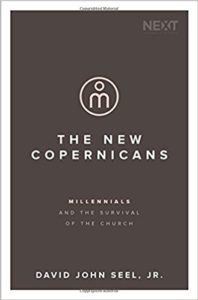 differently than the previous millennial cohort. How do we understand these Gen Z older youth? How can we work with millennials, most who are in their late 20s, now. (We can read John Seel’s brilliant, provocative, well-written The New Copernicans: Millennial and the Survival of the Church for starters!) Marv Nelson has worked with college-age twenty somethings for years and is a good, experienced guide.
differently than the previous millennial cohort. How do we understand these Gen Z older youth? How can we work with millennials, most who are in their late 20s, now. (We can read John Seel’s brilliant, provocative, well-written The New Copernicans: Millennial and the Survival of the Church for starters!) Marv Nelson has worked with college-age twenty somethings for years and is a good, experienced guide.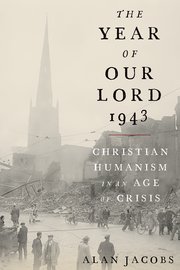 The Year of Our Lord 1943: Christian Humanism in an Age of Crisis Alan Jacobs (Oxford University Press) $29.95 We get any number of new academic books from university and other scholarly presses into the store but none have excited me lately as much as this. It is on my short list of books to read very soon – I am guessing I will name it as one of the most significant books of 2018. Anything Alan Jacobs writes is well worth reading; he is a wise scholar and public intellectual esteemed by many within evangelicalism and beyond. (Dr. Jacobs is distinguished Professor of the Humanities in the Honors Program at Baylor University.) His most recent previous book is the wonderful 2017 release How to Think: A Survival Guide for a World at Odds although we still tout his lovely The Pleasures of Reading in an Age of Distraction. In some circles he is known for his “biography” of the Book of Common Prayer while in others he is most beloved for the great bio of C.S. Lewis called The Narnian.
The Year of Our Lord 1943: Christian Humanism in an Age of Crisis Alan Jacobs (Oxford University Press) $29.95 We get any number of new academic books from university and other scholarly presses into the store but none have excited me lately as much as this. It is on my short list of books to read very soon – I am guessing I will name it as one of the most significant books of 2018. Anything Alan Jacobs writes is well worth reading; he is a wise scholar and public intellectual esteemed by many within evangelicalism and beyond. (Dr. Jacobs is distinguished Professor of the Humanities in the Honors Program at Baylor University.) His most recent previous book is the wonderful 2017 release How to Think: A Survival Guide for a World at Odds although we still tout his lovely The Pleasures of Reading in an Age of Distraction. In some circles he is known for his “biography” of the Book of Common Prayer while in others he is most beloved for the great bio of C.S. Lewis called The Narnian.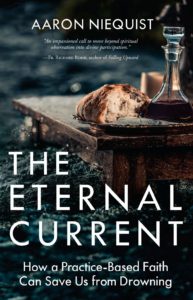 The Eternal Current: How a Practice-Based Faith Can Save Us From Drowning Aaron Niequist (Waterbrook) $19.99 That evangelicals have been in the forefront of writing great books and advocating for deeper, even classic spiritual practices is nothing new, nowadays. For decades, I’ve said that this confluence – perhaps starting with Richard Foster – of previously skeptical evangelicals and monastic and mystical literature is one of the most significant religious trends of our lifetime. One only need to think of the beautiful body of literature in the last decades written by those in the evangelical tradition – Ruth Haley Barton, Adele Ahlberg Calhoun, Gary Moon, John Ortberg, Jan Johnson, Donald Whitney, Dallas Willard, Marlena Graves, to name only a few. Or, one only has to think of the broader tradition of spirituality that these evangelicals are in conversation with, popular authors from Richard Rohr to Joan Chittister, Elizabeth Liebert, Marjorie Thompson, Martin Laird, Joyce Rupp, Ronald Rolheiser, Thomas Keating; obviously, writers like Henri Nouwen and Thomas Merton are on everybody’s lists. And nearly everybody in this field is now interested in Saint Benedict and Ignatius of Loyola and Practicing the Presence of God and works by medievals like Julian of Norwich and St. John of the Cross and St. Teresa of Avila. Evangelicals used to protest our store because we carried those kinds of books; now folks don’t find it that surprising (even though most big-box chain evangelical bookstores still don’t carry them.)
The Eternal Current: How a Practice-Based Faith Can Save Us From Drowning Aaron Niequist (Waterbrook) $19.99 That evangelicals have been in the forefront of writing great books and advocating for deeper, even classic spiritual practices is nothing new, nowadays. For decades, I’ve said that this confluence – perhaps starting with Richard Foster – of previously skeptical evangelicals and monastic and mystical literature is one of the most significant religious trends of our lifetime. One only need to think of the beautiful body of literature in the last decades written by those in the evangelical tradition – Ruth Haley Barton, Adele Ahlberg Calhoun, Gary Moon, John Ortberg, Jan Johnson, Donald Whitney, Dallas Willard, Marlena Graves, to name only a few. Or, one only has to think of the broader tradition of spirituality that these evangelicals are in conversation with, popular authors from Richard Rohr to Joan Chittister, Elizabeth Liebert, Marjorie Thompson, Martin Laird, Joyce Rupp, Ronald Rolheiser, Thomas Keating; obviously, writers like Henri Nouwen and Thomas Merton are on everybody’s lists. And nearly everybody in this field is now interested in Saint Benedict and Ignatius of Loyola and Practicing the Presence of God and works by medievals like Julian of Norwich and St. John of the Cross and St. Teresa of Avila. Evangelicals used to protest our store because we carried those kinds of books; now folks don’t find it that surprising (even though most big-box chain evangelical bookstores still don’t carry them.)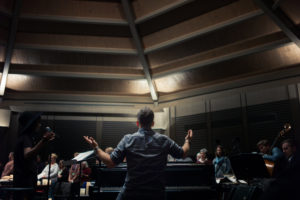
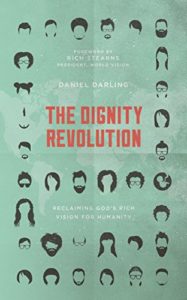 The Dignity Revolution: Reclaiming God’s Rich Vision for Humanity Daniel Darling (The Good Book Company) $16.99 It’s not every day that serious theology is discussed on national TV, but Daniel Darling was set up nicely by “Morning Joe” on MSNBC as they talked about the Bible, God having made human’s in God’s image, and why that means we have certain Christian obligations to stand for those whose dignity is assaulted. (
The Dignity Revolution: Reclaiming God’s Rich Vision for Humanity Daniel Darling (The Good Book Company) $16.99 It’s not every day that serious theology is discussed on national TV, but Daniel Darling was set up nicely by “Morning Joe” on MSNBC as they talked about the Bible, God having made human’s in God’s image, and why that means we have certain Christian obligations to stand for those whose dignity is assaulted. (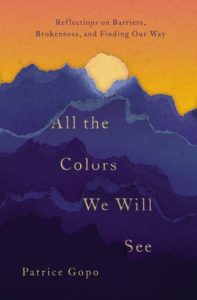 All the Colors We Will See: Reflections on Barriers, Brokenness, and Finding Our Way Patrice Gopo (Thomas Nelson) $16.99 Beth and I have been eager for this book to arrive as we are reading even more than ever on books by people of color, memoirs and reflections to help us understand our culture these days and learn to be more effective agents navigating various subcultures and to somehow be able to do the work of being agents of God’s reconciliation. As we noted in the last big BookNotes column, we love memoirs and are most eager to promote books when they are well written and nicely packaged. Well, All the Colors We Will See is a simply lovely volume, and the author is remarkable, as a gifted writer and as one with a curious, interesting story. A great blurb on the back by award-winning writer Bret Lott is pretty darn special, too. He notes Gopo’s “calm voice and winsome demeanor” which allows her to speak hard truths… including “what it takes to continue in Christ’s love despite the fallen and falling world around us.”
All the Colors We Will See: Reflections on Barriers, Brokenness, and Finding Our Way Patrice Gopo (Thomas Nelson) $16.99 Beth and I have been eager for this book to arrive as we are reading even more than ever on books by people of color, memoirs and reflections to help us understand our culture these days and learn to be more effective agents navigating various subcultures and to somehow be able to do the work of being agents of God’s reconciliation. As we noted in the last big BookNotes column, we love memoirs and are most eager to promote books when they are well written and nicely packaged. Well, All the Colors We Will See is a simply lovely volume, and the author is remarkable, as a gifted writer and as one with a curious, interesting story. A great blurb on the back by award-winning writer Bret Lott is pretty darn special, too. He notes Gopo’s “calm voice and winsome demeanor” which allows her to speak hard truths… including “what it takes to continue in Christ’s love despite the fallen and falling world around us.”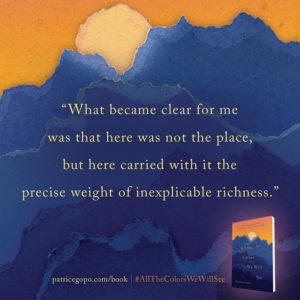 Later, we learn that she studied chemical engineering in Pittsburgh, at CMU, was married in South Africa, and then moved to a new home in the American Southland (with a husband who wasn’t American.) She has learned to be an evocative and luminous essayist, as a quick dip into nearly any page will show. As it says on the back cover, “Patrice’s life is a testament to the challenges and beauty of the world we live in, a world in which cultures overlap every day.”
Later, we learn that she studied chemical engineering in Pittsburgh, at CMU, was married in South Africa, and then moved to a new home in the American Southland (with a husband who wasn’t American.) She has learned to be an evocative and luminous essayist, as a quick dip into nearly any page will show. As it says on the back cover, “Patrice’s life is a testament to the challenges and beauty of the world we live in, a world in which cultures overlap every day.”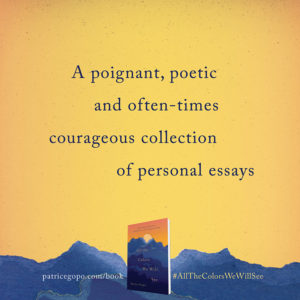
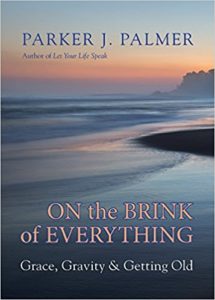
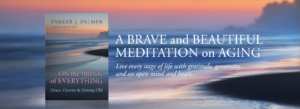
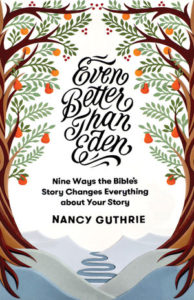 Even Better than Eden: Nine Ways the Bible’s Story Changes Everything About Your Story Nancy Guthrie (Crossway) $16.99 We really respect this thoughtfully conservative, Reformed Bible teacher. She has a podcast through the Gospel Coalition on learning how to teach the Bible that I hear is very good. (Michael Horton, the tough-minded, serious theologian, has said that Ms. Guthrie is “one of the best Scripture teachers I have ever heard or read.” Guthrie is obviously a good exegete, a fine teacher, and a colorful, if careful, wordsmith. Her books are valuable for many purposes and we commend them often. (That she has several books on grief and the ministry of walking with those in grief is itself significant, too.) Perhaps you know her several-volume study set called “Seeing Jesus in the Old Testament.” I like that she has that historical-redemptive hermeneutic, seeing the unfolding drama of the coherent Bible study, all of it pointing to Christ and his redemptive work.
Even Better than Eden: Nine Ways the Bible’s Story Changes Everything About Your Story Nancy Guthrie (Crossway) $16.99 We really respect this thoughtfully conservative, Reformed Bible teacher. She has a podcast through the Gospel Coalition on learning how to teach the Bible that I hear is very good. (Michael Horton, the tough-minded, serious theologian, has said that Ms. Guthrie is “one of the best Scripture teachers I have ever heard or read.” Guthrie is obviously a good exegete, a fine teacher, and a colorful, if careful, wordsmith. Her books are valuable for many purposes and we commend them often. (That she has several books on grief and the ministry of walking with those in grief is itself significant, too.) Perhaps you know her several-volume study set called “Seeing Jesus in the Old Testament.” I like that she has that historical-redemptive hermeneutic, seeing the unfolding drama of the coherent Bible study, all of it pointing to Christ and his redemptive work.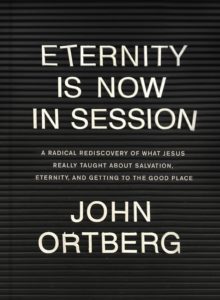 Eternity Is Now in Session: A Radical Rediscovery of What Jesus Really Taught About Salvation, Eternity and Getting to the Good Place John Ortberg (Tyndale) $17.99 I love this, even though it just came yesterday and I’ve only glanced at it. Just holding it in my hand feels right – it’s a tiny bit differently shaped and the textured cover is cool. The title just shouts “N.T. Wright” but he’s not cited at all in the footnotes. (I checked.) I doubt he says “realized eschatology” because it just isn’t’ that kind of book. It is thoughtful and solid and lucid and passionate and very, very useful, I’m sure. And it does quote Dallas Willard, as all of John’s books do.
Eternity Is Now in Session: A Radical Rediscovery of What Jesus Really Taught About Salvation, Eternity and Getting to the Good Place John Ortberg (Tyndale) $17.99 I love this, even though it just came yesterday and I’ve only glanced at it. Just holding it in my hand feels right – it’s a tiny bit differently shaped and the textured cover is cool. The title just shouts “N.T. Wright” but he’s not cited at all in the footnotes. (I checked.) I doubt he says “realized eschatology” because it just isn’t’ that kind of book. It is thoughtful and solid and lucid and passionate and very, very useful, I’m sure. And it does quote Dallas Willard, as all of John’s books do.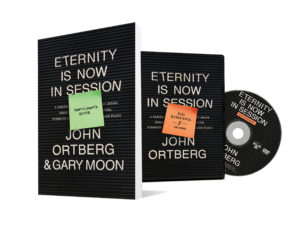 DVD Eternity Is Now in Session Video Experience John Ortberg (Tyndale Momentum) $36.99 There is also a DVD curriculum that is based on the content of the book. The DVD is creatively done, showing Ortberg teaching this material in five sessions. Perfect for an adult Sunday school class or a small home group. The package comes with a DVD and one workbook. You can buy extra participants guides singularly for $10.99.
DVD Eternity Is Now in Session Video Experience John Ortberg (Tyndale Momentum) $36.99 There is also a DVD curriculum that is based on the content of the book. The DVD is creatively done, showing Ortberg teaching this material in five sessions. Perfect for an adult Sunday school class or a small home group. The package comes with a DVD and one workbook. You can buy extra participants guides singularly for $10.99.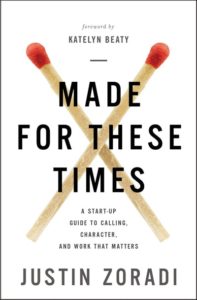 Made for These Times: A Start-Up Guide to Calling, Character, and Work that Matters Justin Zoradi (Zondervan) $16.99 Oh my, how I wish I could explain the energy and vision of this author and our enthusiasm for telling you about it. I can brag a little, saying that the author tells more than once about his experienced of being mentored by dear, dear friends of ours at Calvin College in Grand Rapids Michigan. There, in his college years, Justin met Katelyn Beaty who wrote a very good forward (also giving a shout out to the influences of her college years and her engagement with pop culture, issues of the day, and learning the art of cultural discernment through our friends there in GR.) When an early reader wrote to me a week ago and said Zoradi sounds like he’d make a great speaker for our big Jubilee conference in Pittsburgh, I knew exactly why that is so. This guy was influenced by folks who helped shape that impressive annual gathering of young adults when they themselves were involved with the conference some 45 years ago. Zoradi is our kind of guy!
Made for These Times: A Start-Up Guide to Calling, Character, and Work that Matters Justin Zoradi (Zondervan) $16.99 Oh my, how I wish I could explain the energy and vision of this author and our enthusiasm for telling you about it. I can brag a little, saying that the author tells more than once about his experienced of being mentored by dear, dear friends of ours at Calvin College in Grand Rapids Michigan. There, in his college years, Justin met Katelyn Beaty who wrote a very good forward (also giving a shout out to the influences of her college years and her engagement with pop culture, issues of the day, and learning the art of cultural discernment through our friends there in GR.) When an early reader wrote to me a week ago and said Zoradi sounds like he’d make a great speaker for our big Jubilee conference in Pittsburgh, I knew exactly why that is so. This guy was influenced by folks who helped shape that impressive annual gathering of young adults when they themselves were involved with the conference some 45 years ago. Zoradi is our kind of guy!
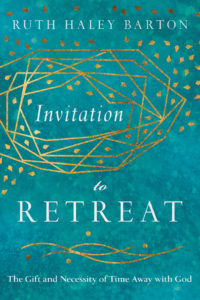 Invitation to Retreat: The Gift and Necessity of Time Away with God Ruth Haley Barton (IVP) $22.00 Once again, InterVarsity Press and its “formatio” line of books has given us a gift, a beautiful even if challenging one. Many books about spirituality are lovely and warm, inviting us to disciplines or practices, but they are often mostly a reminder of God’s presence and of the gift of God’s daily guidance. Sweet. Ruth Haley Barton is one of the truly gifted teachers of our time and she has this sweet way in her books and DVD (Sacred Rhythms) that is exceptional; extraordinary. She is gentle, winsome, inviting, welcoming, encouraging, but also very clear about the sort of things that the classic tradition (and her hard-earned wisdom) has taught her, things that are asked of us, things we must do if we are going to be in a place where God’s transforming work can be fruitful. She doesn’t offer a new legalism or expect us to all become monastics. But yet, she knows the freedom and health that comes from submitted to some sort of rule of life. And, naturally, this comes to the question of finding space for God.
Invitation to Retreat: The Gift and Necessity of Time Away with God Ruth Haley Barton (IVP) $22.00 Once again, InterVarsity Press and its “formatio” line of books has given us a gift, a beautiful even if challenging one. Many books about spirituality are lovely and warm, inviting us to disciplines or practices, but they are often mostly a reminder of God’s presence and of the gift of God’s daily guidance. Sweet. Ruth Haley Barton is one of the truly gifted teachers of our time and she has this sweet way in her books and DVD (Sacred Rhythms) that is exceptional; extraordinary. She is gentle, winsome, inviting, welcoming, encouraging, but also very clear about the sort of things that the classic tradition (and her hard-earned wisdom) has taught her, things that are asked of us, things we must do if we are going to be in a place where God’s transforming work can be fruitful. She doesn’t offer a new legalism or expect us to all become monastics. But yet, she knows the freedom and health that comes from submitted to some sort of rule of life. And, naturally, this comes to the question of finding space for God.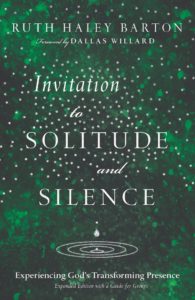 In fact, one of her early books, Invitation to Silence and Solitude now given a beautiful new dust jacket to match this brand new Invitation to Retreat) was very dear to her. Many loved it. On the speaking tour that ensued, and her teaching based on the book, so many folks replied that they’d just love to spend time away with God, they’d truly value solitude and scheduled silence – but they just don’t have the time. I’m not saying I was one of those people, but I might have been.
In fact, one of her early books, Invitation to Silence and Solitude now given a beautiful new dust jacket to match this brand new Invitation to Retreat) was very dear to her. Many loved it. On the speaking tour that ensued, and her teaching based on the book, so many folks replied that they’d just love to spend time away with God, they’d truly value solitude and scheduled silence – but they just don’t have the time. I’m not saying I was one of those people, but I might have been.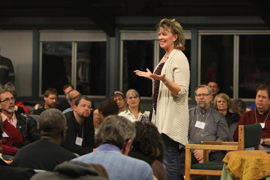 To wit, we come to this long-awaited book by Ruth Haley Barton, emerging from this long appreciation she has had about how difficult it is for many of us to do this kind of thing. She has taught (through her Transforming Center) spiritual practices for years, in many settings, and it often comes up: how in the world does one do a spiritual retreat, anyway?
To wit, we come to this long-awaited book by Ruth Haley Barton, emerging from this long appreciation she has had about how difficult it is for many of us to do this kind of thing. She has taught (through her Transforming Center) spiritual practices for years, in many settings, and it often comes up: how in the world does one do a spiritual retreat, anyway?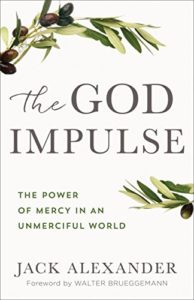 The God Impulse: The Power of Mercy in an Unmerciful World Jack Alexander (Baker) $14.99 Almost anyone with some Biblical knowledge and a couple of good stories can write a book about showing God’s love, about the power of mercy. With a bit more savvy, one can analyze the culture a bit and show how very unmerciful we are. This isn’t rocket science, but not too many have done it very well.
The God Impulse: The Power of Mercy in an Unmerciful World Jack Alexander (Baker) $14.99 Almost anyone with some Biblical knowledge and a couple of good stories can write a book about showing God’s love, about the power of mercy. With a bit more savvy, one can analyze the culture a bit and show how very unmerciful we are. This isn’t rocket science, but not too many have done it very well.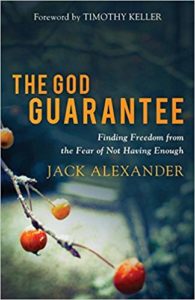 One does not have to read The God Guarantee but this does feel a bit like a sequel or spin off of that previous work. If God is so reliable that we can trust the gospel above all things, then we can be free with our assets, we can be Good Samaritans, we can be liberated from self-concern and give ourselves away, we can forgive and show mercy. We can live as Kingdom people, as Sermon on the Mount people.
One does not have to read The God Guarantee but this does feel a bit like a sequel or spin off of that previous work. If God is so reliable that we can trust the gospel above all things, then we can be free with our assets, we can be Good Samaritans, we can be liberated from self-concern and give ourselves away, we can forgive and show mercy. We can live as Kingdom people, as Sermon on the Mount people.